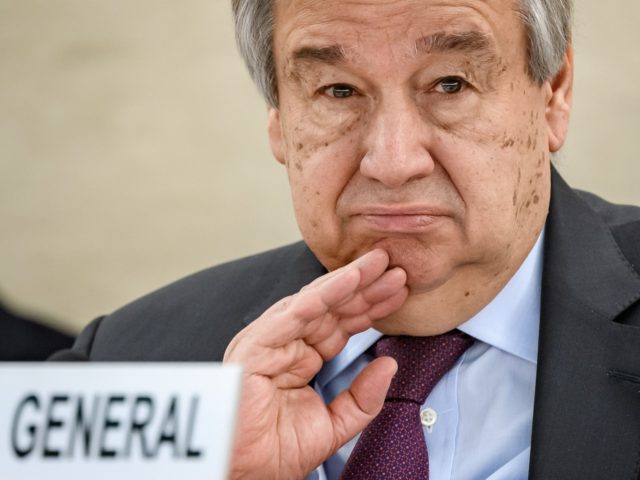The United Nations on Thursday issued its biggest ever call on the developed world to fund its emergency operations over the next 12 months, pinpointing the Ukraine conflict alongside other wars, climate challenges, famine, floods, Afghanistan relief, and the ever present coronavirus pandemic on its list of priorities.
A record $51.5 billion is the targeted amount sought by the globalist organization for redistribution to causes it deems necessary.
The U.N.’s annual Global Humanitarian Overview estimated 339 million people worldwide will need some form of emergency assistance next year – 65 million more than the estimate a year ago, AFP reports.
The annual appeal by U.N. agencies and other humanitarian organisations declared providing aid to the 230 million most vulnerable people across 68 countries would require a record $51.5 billion as a starting point.
Climate events, food insecurity, forced displacement, and wars have taken a dire toll on a range of countries, not least on Ukraine, where Russia’s full-scale invasion in February has left millions in dire need, according to the U.N. agency.
“Next year is going to be the biggest humanitarian programme” the world has ever seen, U.N. aid chief Martin Griffiths told reporters in Geneva, even as critics in the past have challenged the spending priorities of the organization.
The UN is giving cash to migrants trekking up through South America and Mexico, says Todd Bensman at the Center for Immigration Studies. https://t.co/1FBsp2dJWN
— Breitbart News (@BreitbartNews) January 19, 2022
“It’s going to go up by about 25% and that’s a shocker,” Griffiths added without giving specific figures. “It’s gone up about each year by about 25% in recent years … the gap between needs and funding is going to grow.”
He said in 2022 the U.N. had only received about 44 percent of the money needed, adding: “In years gone by, we’ve seen 60-65% as a norm.”
Griffiths said the gap between funding and needs was growing because of the “knock-on effects of the last couple of years” from events like the war in Ukraine, conflict, the COVID-19 pandemic and other crises, like a spike in cholera outbreaks.
In the wake of Joe Biden's Afghanistan catastrophe, Afghanistan’s Taliban-controlled central bank on Thursday announced the receipt of $32 million in cash from the United Nations. https://t.co/zFePQE1Ics
— Breitbart News (@BreitbartNews) January 23, 2022
He predicted the gap would build in 2023 and “frankly we are going to continue to fail, in many more countries, the high numbers of people that we serve and we serve roughly a population which is equivalent to about the third-most populous nation in the world.”
“There’s no doubt that 2023 is going to perpetuate these ‘on steroids’ trends [particularly in climate crisis].”
The figure of 339 million who will need aid– or one in 23 people – was, he added, “equivalent to the third most populous country in the world [after China and India], so it’s a phenomenal number, and it’s a depressing number.”
U.N. chief Antonio Guterres called for the world to “urgently redistribute power” so as to end gender inequality which he said “should shame us all in the 21st century because it is not only unacceptable, it is stupid.” https://t.co/sPyAaYudUL
— Breitbart News (@BreitbartNews) February 28, 2020
Those projected to be in need of assistance are spread over 68 countries, but in 10 of them, where the U.N. has unveiled humanitarian relief plans costing more than $1bn, the needs are deemed to be particularly high.
They include Afghanistan, Syria, Yemen, Ukraine, Ethiopia, the Democratic Republic of the Congo and Somalia, which stands on the brink of famine.
The U.N.’s regular and peacekeeping budgets are approved by the U.N. General Assembly.
For 2022, the regular operating budget stood at $3.12 billion, approximately 20 percent of which is for special political missions alone. This covers nearly 40,000 U.N. employees distributed around the world as well as U.N. headquarters in New York and associated offices in Geneva, Switzerland.

COMMENTS
Please let us know if you're having issues with commenting.